From Moscow to Silicon Valley: how Alexander Kirov improves Pebble smart watches
Would you like to get a job in Silicon Valley and participate in the development of a product that rattles the whole world? Is this not the dream of every second geek? Alexander Kirov , a former product dedesigner from Mail.Ru, who calls himself a very unorganized person (he dropped out of his studies at two institutes), has his recipe for achieving a dream: if you have been turned away, do not be afraid to knock again until you get your way . He, for example, was sewn off both Google and Facebook, but in the end Alexander went to California and joined the American team Pebble , which became famous around the world with smart watches of the same name (and also kicked it off first). We asked Alexander to tell how he managed to do this and how his new life differs from the old one in Moscow.
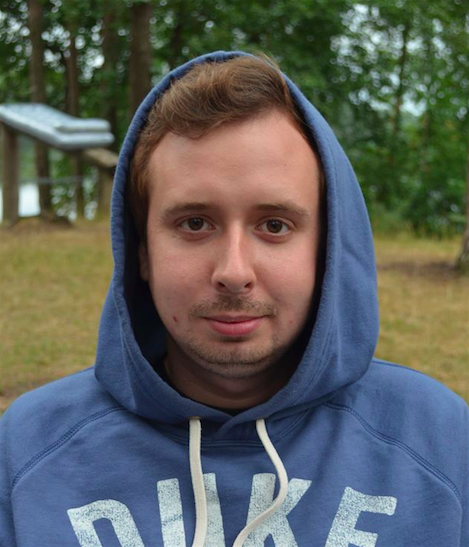
- There have been quite a few attempts and searches in my life. But it turned out that it was they who formed my character. So, with study, I did not develop for quite a long time. After school, I graduated from a IT specialist for a year, then another year at a manager, but in both cases I quickly became bored, and I dropped out of school. True, he always worked in parallel - first as a sysadmin, then as a website development manager at Eto Easy, he was a project manager in the digital division of a large advertising agency Lowe Adventa. Then I started studying for a while and realized that it was more interesting for me to do more creative work than management or programming. I decided to try myself in design.
')
In 2011, I got into Mail.Ru. I saw the vacancy of the mobile designer, did not hope for anything, did a test task and unexpectedly passed the selection. At that time I didn’t have fulltime experience directly in the design, but for several years I have been doing freelance design projects, and in an advertising agency I distributed tasks in such a way that I could do the design work myself.
In Mail.Ru, I became the first designer who dealt exclusively with mobile projects. Previously, the company's designers worked on mobile applications and web interfaces. But six months before me, Yura Vetrov came to the company, he first began to divide these areas. There I found myself and finally realized that I had made the right choice. Therefore, in parallel with the main work, I continued to engage in freelancing, slowly adding projects to my portfolio.
In 2011, I signed up on the site of AngelList, one of the world's largest platforms for investors and startups. There is a special service Talent, which allows companies to post vacancies and select a team of engineers, IT specialists and other specialists from related areas. From there sometimes came small job offers, nothing serious. This went on for about a year and a half. I did not set myself a special goal to get to America and I was not particularly upset that it somehow did not add up to the proposals.
After a while, quite unexpectedly, Facebook found me.
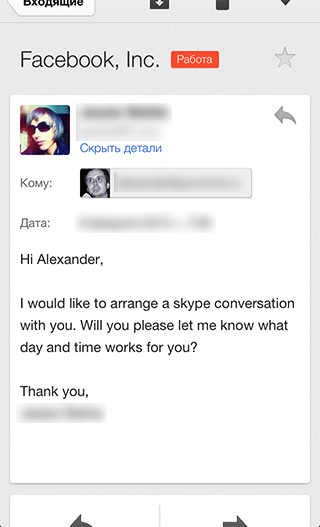
A little later, managed to interest and the guys from "Google" .
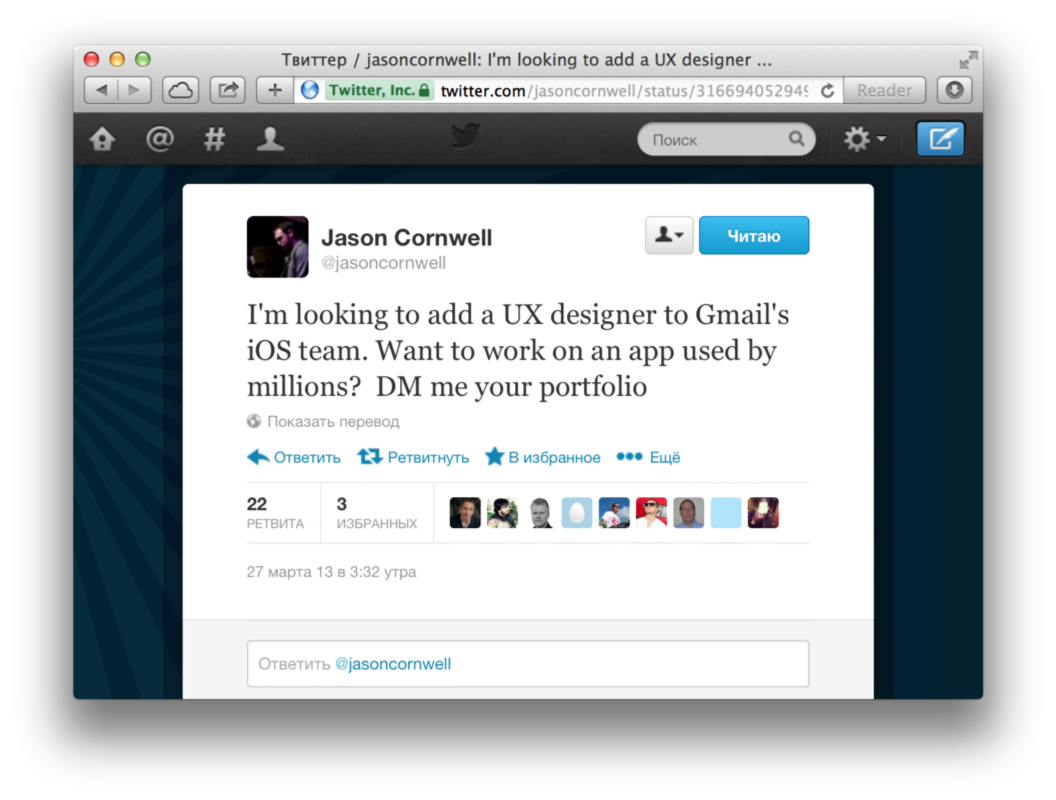
During the time that I worked on Mail.Ru projects, as well as on many projects in freelancing, my level was pulled up. As a designer, I felt quite confident.
I think Facebook found me through my Scoutzie blog article on how to become a mobile designer - it turned out to be quite successful in both Russian and English. My portfolio also differed from the standard design pictures “see how I can”. Instead of a heap of disparate images, from the very beginning I tried to make the portfolio structured so that it showed my work on products for a long time. Perhaps this also played a role.
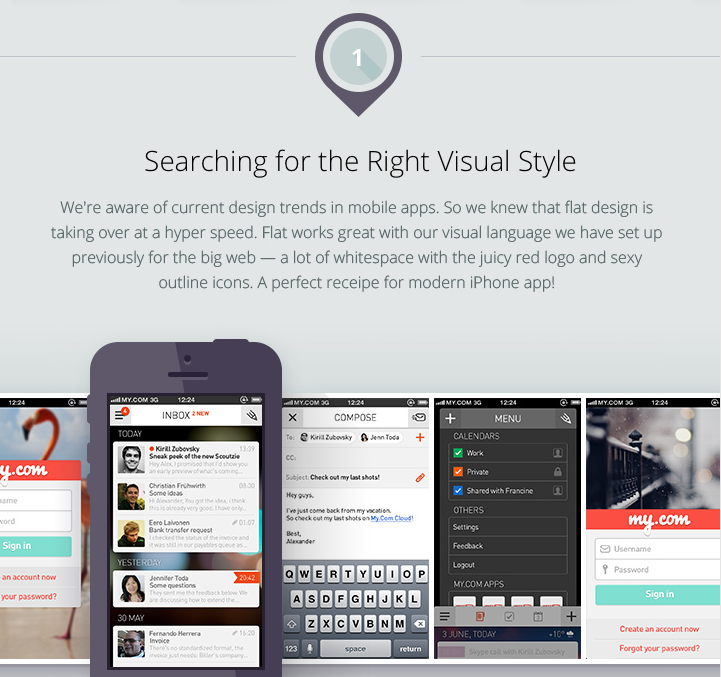
A fragment of the case " My.com iPhone Mail " from my portfolio
A little advice for those who want to tighten up English: take orders from English-speaking customers. In this way, my English was pulled from almost zero level to quite tolerable. In the near future it was very useful to me.
In 2013, a friend of mine, Kirill Zubovsky, recommended me at Pebble (he founded the service for designers Scoutzie.com ). Cyril introduced me to the Canadian Eric Magikovsky, the founder of Pebble.
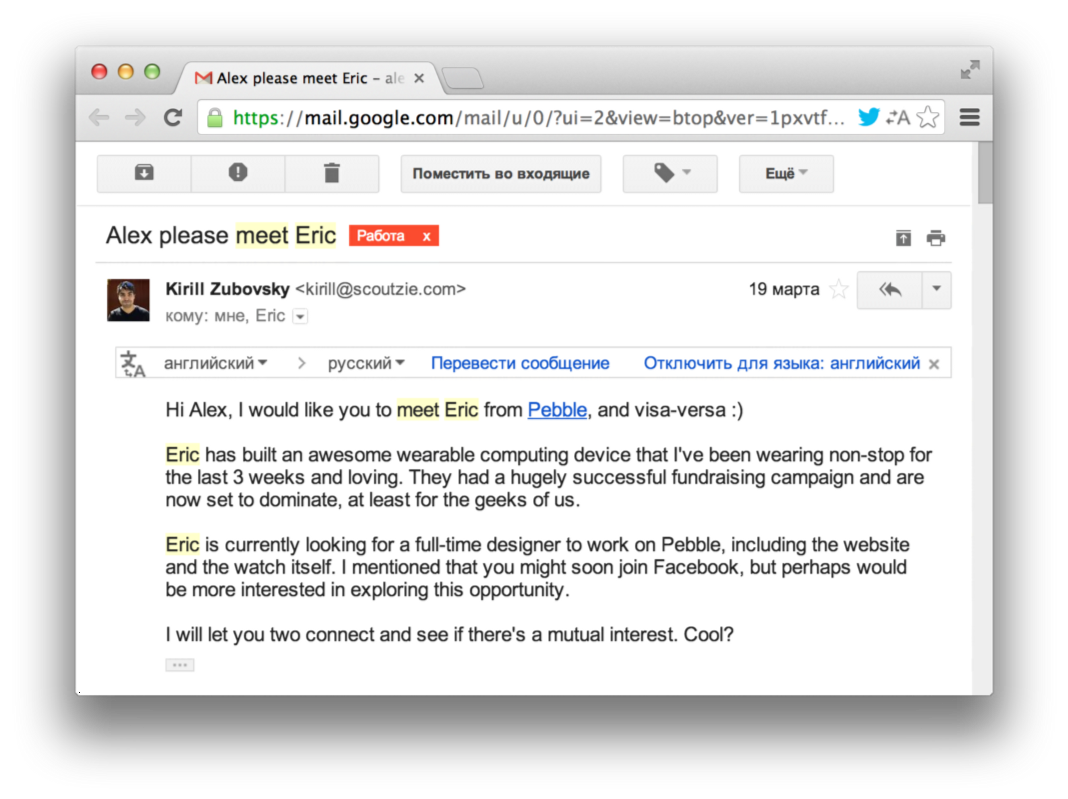
We got in touch with him and even agreed on an interview via Skype, but first Erik forgot about the scheduled interview time (a very busy person, what can you do), and after it did take place, he told me that so far they have nothing to offer me and disappeared for several months.
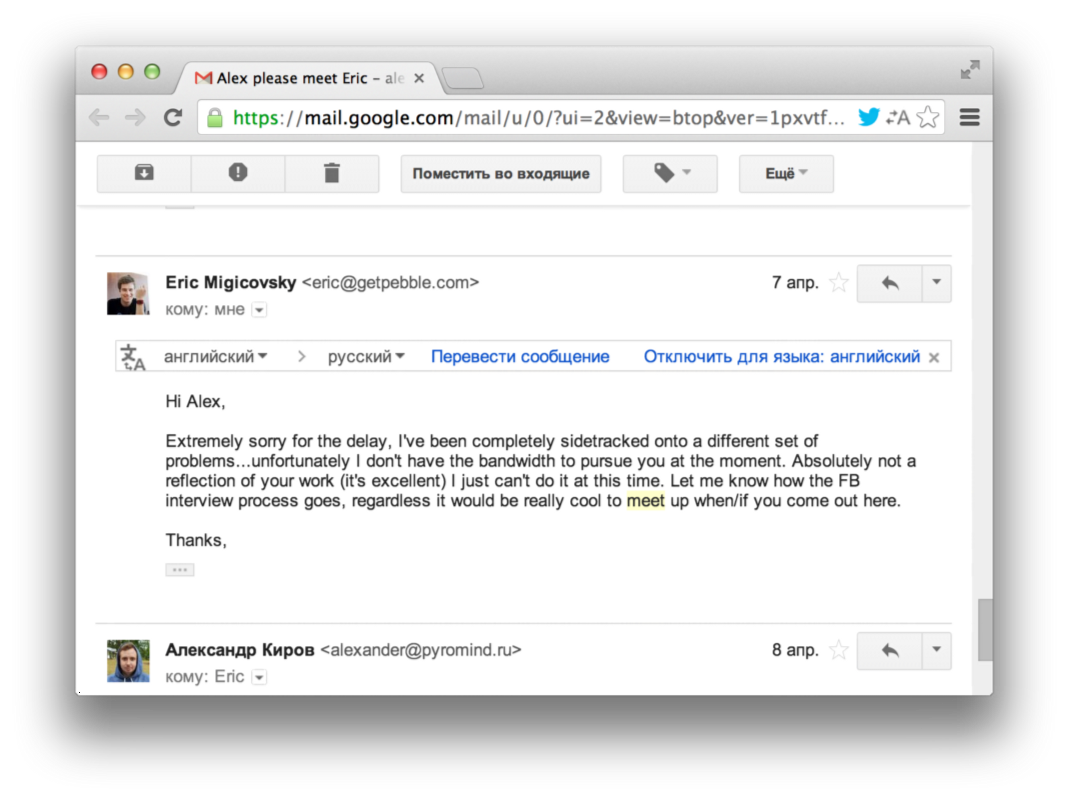
Later, I learned that in Pebble, then problems began with the production, and they just became not up to me.
The conversation with Eric inspired me a lot - after our conversation, several ideas started spinning in my head that I could implement in the framework of Pebble. These thoughts sat in my head, but alas, in the Pebble everything was deaf. Then I gathered courage and in a couple of months wrote to Eric again - after all, he did not give me an official refusal. And then - about a miracle! - he literally immediately invited me for an interview , directly to their office in Palo Alto. Now I sometimes wonder, what would have happened if I hadn’t written to them again?
Hopeful, I went to the Valley. As a test, I worked two eight-hour working days at Pebble. In the morning of the first day, the engineers gave me a smartphone on the android and the watch itself (I did not have the opportunity to meet them in Russia), asked to study them and tell what could be changed for the better in my opinion. I sketched about fifty points, and closer to dinner I voiced them to the engineers. They asked for some ideas to be worked out separately. At the end of the first day, I presented my solutions to them, visualizing them in the form of draft layouts. On the second day I was asked to work out in more detail two or three of the most interesting cases. By evening, I managed this task.

Pebble managers sit in this part of the office.
At Pebble, for some reason, they were sure that I had another day left, but it turned out that my plane was leaving the next morning. I had to quickly fold. But literally in a few days, an official job offer came to my mail. I quickly thought over all the pros and cons and decided to go, because the opportunity was absolutely unique, one of those that is provided once in a lifetime. But getting a work visa in the US is a long process - so for the first eight months I worked remotely from Russia, getting an hourly fee. Together with my wife, we finally moved to Palo Alto only in April. And here, finally, it was possible to learn from the inside, what is work in a successful startup Silicon Valley.

And this is a technical area. Green things protect from the sun - large windows in the roof and in the afternoon direct sunlight fall on you, nothing is visible on the screens. The solution to the problem found in IKEA.
Compared to Mail.Ru, my income at Pebble has approximately doubled, but the level of expenses after moving has grown even more. In addition, income taxes here are two or three times higher than ours, it must also be borne in mind . In general, at first it was very hard with money in the USA. The company paid for flights, car rental and hotel for the first time. But, having moved, I had to leave pledges, deposits and initial installments everywhere - everything is tied to the credit history, but I don’t have it. By the way, our company does not rent housing for expat employees. But Pebble has its own large guest house, it is called in the Spanish style Casa De Pebble. There are living travelers and those who have just arrived and are still looking for an apartment in a new place.
The approach to workflow organization in Pebble is markedly different from what I'm used to. In Mail.Ru, all my working hours were planned out for meetings and tasks. Here, on the contrary, I am my own master. Formally, I have a boss, in fact, no. Here they look only at how quickly and efficiently you cope with your tasks. How many hours at the same time you spend in the office is not so important. Because of this, there is no stressful feeling that you are constantly customized.

My work place
Now we have more than fifty people in the office, another hundred or so work remotely. It is very striking that in Pebble there is no clear separation of professions: it often happens that managers who do business and build partnerships program themselves, and developers often make business decisions. The team due to this exists as a living organism.
Since Pebble design is part of almost any process, and not a separate direction, I regularly have to join various projects and adapt to their realities. For comparison: in Mail.ru, I worked on the design of a single product (mainly engaged in “Mail”, and later on “Calendar” and several side projects) on a heap of different platforms. Here, I cover a lot of areas - this is the design of mobile application interfaces, and the design of concepts for future interface solutions, and hardware design, and websites. Plus, I work closely with the marketing team - together we come up with and create advertising campaigns.
For example, Pebble recently acted as a partner and sponsor of a running marathon in San Francisco. Especially for this marathon, we created a separate application, and I was engaged in its design. In addition to me, there are quite a few designers in the team - but for the most part they are directly involved in developing the look of the watch themselves, along with the engineers. The working day looks different. As a standard, I arrive at the office at 9-9.30 am, and leave at six in the evening. In general, people here are trying to start working as early as possible and finish as soon as possible.
At the same time, sometimes colleagues can come in two days and leave at five o'clock in the evening, and this does not disturb anyone. If there is no urgent business, no one bothers to leave earlier. And if there are urgent tasks, you are delayed to be in time. For example, in my eight months remotely it happened that I worked for several days in a row from morning to evening, and then I did nothing at all for a week or two - there was time to do concepts and experiments.

Outdoor dining area
I am a very unorganized person, I can easily forget about a meeting or an important matter. Back in Mail.Ru, I had to train myself for hard time management. Everything is simple - I use online gliders. Previously, it was a Wunderlist application, now I switched to Todoist. The habit of planning developed quickly, and has long been automatic. In Pebble, I also used to set a deadline for each work task, regardless of whether they ask to complete it within a certain time frame or not.
When I left for Pebble, I was afraid that spoken English would become the most serious obstacle — after all, I didn’t have much practice. But nothing like that.
Earlier, in Russia, I used to work with expats, and it was difficult. Here, everyone adapts to you - if you are a novice and while you do not speak very well, no one will tease and make claims to you, on the contrary, everyone will try to speak more slowly and in a simpler language. And this does not annoy anyone. Two months in the Pebble office were not in vain - now I communicate with colleagues on professional topics much freer.
I still have no certainty whether the product designer needs special education. Neither in Russia, nor even in the United States, no one asked me about the tower. Everyone looks only at the portfolio and completed test task. However, while still working at an advertising agency, I entered the Moscow Institute of Business and Law at an advertising faculty (specialty “Design”). I quickly realized that studying at the university does not give me anything and will not give, but it is a shame to leave the third institute in a row, and I wanted to get a higher education purely from the principle.
Now I'm at the finish line. Recently, he came from California to Russia for a week to pass a state exam. By the way, when I left the United States, I did not personally notify my colleagues — I simply wrote in the internal calendar that I would work from the office for a week. We have enough of it.
Subscribe to Alexander can be on Twitter .






FIRST MOBILE
- There have been quite a few attempts and searches in my life. But it turned out that it was they who formed my character. So, with study, I did not develop for quite a long time. After school, I graduated from a IT specialist for a year, then another year at a manager, but in both cases I quickly became bored, and I dropped out of school. True, he always worked in parallel - first as a sysadmin, then as a website development manager at Eto Easy, he was a project manager in the digital division of a large advertising agency Lowe Adventa. Then I started studying for a while and realized that it was more interesting for me to do more creative work than management or programming. I decided to try myself in design.
')
In 2011, I got into Mail.Ru. I saw the vacancy of the mobile designer, did not hope for anything, did a test task and unexpectedly passed the selection. At that time I didn’t have fulltime experience directly in the design, but for several years I have been doing freelance design projects, and in an advertising agency I distributed tasks in such a way that I could do the design work myself.
In Mail.Ru, I became the first designer who dealt exclusively with mobile projects. Previously, the company's designers worked on mobile applications and web interfaces. But six months before me, Yura Vetrov came to the company, he first began to divide these areas. There I found myself and finally realized that I had made the right choice. Therefore, in parallel with the main work, I continued to engage in freelancing, slowly adding projects to my portfolio.
Facebook, Google and Other Disappointments
In 2011, I signed up on the site of AngelList, one of the world's largest platforms for investors and startups. There is a special service Talent, which allows companies to post vacancies and select a team of engineers, IT specialists and other specialists from related areas. From there sometimes came small job offers, nothing serious. This went on for about a year and a half. I did not set myself a special goal to get to America and I was not particularly upset that it somehow did not add up to the proposals.
After a while, quite unexpectedly, Facebook found me.

A little later, managed to interest and the guys from "Google" .

During the time that I worked on Mail.Ru projects, as well as on many projects in freelancing, my level was pulled up. As a designer, I felt quite confident.
I think Facebook found me through my Scoutzie blog article on how to become a mobile designer - it turned out to be quite successful in both Russian and English. My portfolio also differed from the standard design pictures “see how I can”. Instead of a heap of disparate images, from the very beginning I tried to make the portfolio structured so that it showed my work on products for a long time. Perhaps this also played a role.

A fragment of the case " My.com iPhone Mail " from my portfolio
Both on Facebook and Google, I went through several stages of the interview, but eventually fell off. It was hard not to take these failures as personal failures.
A little advice for those who want to tighten up English: take orders from English-speaking customers. In this way, my English was pulled from almost zero level to quite tolerable. In the near future it was very useful to me.
In 2013, a friend of mine, Kirill Zubovsky, recommended me at Pebble (he founded the service for designers Scoutzie.com ). Cyril introduced me to the Canadian Eric Magikovsky, the founder of Pebble.

We got in touch with him and even agreed on an interview via Skype, but first Erik forgot about the scheduled interview time (a very busy person, what can you do), and after it did take place, he told me that so far they have nothing to offer me and disappeared for several months.

Later, I learned that in Pebble, then problems began with the production, and they just became not up to me.
50 IDEAS
The conversation with Eric inspired me a lot - after our conversation, several ideas started spinning in my head that I could implement in the framework of Pebble. These thoughts sat in my head, but alas, in the Pebble everything was deaf. Then I gathered courage and in a couple of months wrote to Eric again - after all, he did not give me an official refusal. And then - about a miracle! - he literally immediately invited me for an interview , directly to their office in Palo Alto. Now I sometimes wonder, what would have happened if I hadn’t written to them again?
Hopeful, I went to the Valley. As a test, I worked two eight-hour working days at Pebble. In the morning of the first day, the engineers gave me a smartphone on the android and the watch itself (I did not have the opportunity to meet them in Russia), asked to study them and tell what could be changed for the better in my opinion. I sketched about fifty points, and closer to dinner I voiced them to the engineers. They asked for some ideas to be worked out separately. At the end of the first day, I presented my solutions to them, visualizing them in the form of draft layouts. On the second day I was asked to work out in more detail two or three of the most interesting cases. By evening, I managed this task.

Pebble managers sit in this part of the office.
At Pebble, for some reason, they were sure that I had another day left, but it turned out that my plane was leaving the next morning. I had to quickly fold. But literally in a few days, an official job offer came to my mail. I quickly thought over all the pros and cons and decided to go, because the opportunity was absolutely unique, one of those that is provided once in a lifetime. But getting a work visa in the US is a long process - so for the first eight months I worked remotely from Russia, getting an hourly fee. Together with my wife, we finally moved to Palo Alto only in April. And here, finally, it was possible to learn from the inside, what is work in a successful startup Silicon Valley.

And this is a technical area. Green things protect from the sun - large windows in the roof and in the afternoon direct sunlight fall on you, nothing is visible on the screens. The solution to the problem found in IKEA.
Compared to Mail.Ru, my income at Pebble has approximately doubled, but the level of expenses after moving has grown even more. In addition, income taxes here are two or three times higher than ours, it must also be borne in mind . In general, at first it was very hard with money in the USA. The company paid for flights, car rental and hotel for the first time. But, having moved, I had to leave pledges, deposits and initial installments everywhere - everything is tied to the credit history, but I don’t have it. By the way, our company does not rent housing for expat employees. But Pebble has its own large guest house, it is called in the Spanish style Casa De Pebble. There are living travelers and those who have just arrived and are still looking for an apartment in a new place.
HIMSELF OWNERSHIP
The approach to workflow organization in Pebble is markedly different from what I'm used to. In Mail.Ru, all my working hours were planned out for meetings and tasks. Here, on the contrary, I am my own master. Formally, I have a boss, in fact, no. Here they look only at how quickly and efficiently you cope with your tasks. How many hours at the same time you spend in the office is not so important. Because of this, there is no stressful feeling that you are constantly customized.

My work place
Now we have more than fifty people in the office, another hundred or so work remotely. It is very striking that in Pebble there is no clear separation of professions: it often happens that managers who do business and build partnerships program themselves, and developers often make business decisions. The team due to this exists as a living organism.
Since Pebble design is part of almost any process, and not a separate direction, I regularly have to join various projects and adapt to their realities. For comparison: in Mail.ru, I worked on the design of a single product (mainly engaged in “Mail”, and later on “Calendar” and several side projects) on a heap of different platforms. Here, I cover a lot of areas - this is the design of mobile application interfaces, and the design of concepts for future interface solutions, and hardware design, and websites. Plus, I work closely with the marketing team - together we come up with and create advertising campaigns.
For example, Pebble recently acted as a partner and sponsor of a running marathon in San Francisco. Especially for this marathon, we created a separate application, and I was engaged in its design. In addition to me, there are quite a few designers in the team - but for the most part they are directly involved in developing the look of the watch themselves, along with the engineers. The working day looks different. As a standard, I arrive at the office at 9-9.30 am, and leave at six in the evening. In general, people here are trying to start working as early as possible and finish as soon as possible.
By the way, waking up early in the morning is much easier here than in Moscow. Maybe this is due to the climate.
At the same time, sometimes colleagues can come in two days and leave at five o'clock in the evening, and this does not disturb anyone. If there is no urgent business, no one bothers to leave earlier. And if there are urgent tasks, you are delayed to be in time. For example, in my eight months remotely it happened that I worked for several days in a row from morning to evening, and then I did nothing at all for a week or two - there was time to do concepts and experiments.

Outdoor dining area
I am a very unorganized person, I can easily forget about a meeting or an important matter. Back in Mail.Ru, I had to train myself for hard time management. Everything is simple - I use online gliders. Previously, it was a Wunderlist application, now I switched to Todoist. The habit of planning developed quickly, and has long been automatic. In Pebble, I also used to set a deadline for each work task, regardless of whether they ask to complete it within a certain time frame or not.
CULTURE SHOCK
When I left for Pebble, I was afraid that spoken English would become the most serious obstacle — after all, I didn’t have much practice. But nothing like that.
It turned out that in the office and beyond, Americans are very loyal to any level of proficiency in their language. It was a culture shock for me.
Earlier, in Russia, I used to work with expats, and it was difficult. Here, everyone adapts to you - if you are a novice and while you do not speak very well, no one will tease and make claims to you, on the contrary, everyone will try to speak more slowly and in a simpler language. And this does not annoy anyone. Two months in the Pebble office were not in vain - now I communicate with colleagues on professional topics much freer.
I still have no certainty whether the product designer needs special education. Neither in Russia, nor even in the United States, no one asked me about the tower. Everyone looks only at the portfolio and completed test task. However, while still working at an advertising agency, I entered the Moscow Institute of Business and Law at an advertising faculty (specialty “Design”). I quickly realized that studying at the university does not give me anything and will not give, but it is a shame to leave the third institute in a row, and I wanted to get a higher education purely from the principle.
Now I'm at the finish line. Recently, he came from California to Russia for a week to pass a state exam. By the way, when I left the United States, I did not personally notify my colleagues — I simply wrote in the internal calendar that I would work from the office for a week. We have enough of it.
Subscribe to Alexander can be on Twitter .





Source: https://habr.com/ru/post/228699/
All Articles